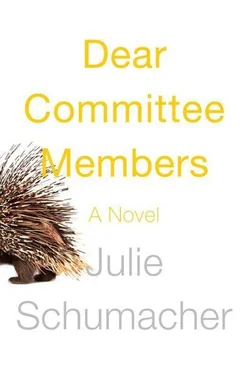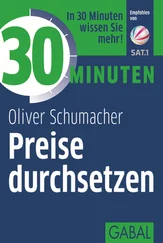Mourning your departure already,
J.
P.S.: I’m sure you know that I’ll miss you terribly, having no other ex-girlfriends and only one resentful ex-wife here on campus. I understand that you don’t want to stay in touch, and I’ll respect that decision. Have you selected the lucky person on whom I’ll bestow my recommendations, once you leave office?
Ballot for Election to the Faculty Senate — please return to the office of Dean Philip Hinckler by July 11, 2010.
You may vote for up to three candidates for the Faculty Senate. Place an X by the names of the faculty for whom you vote. Faculty Senate members serve a (renewable) term of three years.
_____ Winifred Matchett (Sociology)
_____ Klaus Arthursen (German, Scandinavian, and Dutch)
_____ R. T. Sawma (Computer Science)
_____ Philip Lang (Psychology)
_____ Miriam Schoellner (History)
_____ Phoebe Allan (Philosophy)
__X__ Franklin Kentrell (English)
(Electronic Signature and Department or Unit)
J. Fitger
Creative Writing/English
Eleanor Acton, Director
Bentham Literary Residency Program
P.O. Box 1572
Bentham, ME 04976
Dear Eleanor,
The purpose of this letter is to recommend warmly to you a former student, Max Wylie-Hall, for a one-month writer’s residency (January, please) at Bentham. Max completed his undergraduate degree here five years ago (English and anthropology), finishing up cum laude with a 3.8. During his final semester in my fiction workshop he wrote a competent but lethargic story about a sellout who — though he once had dreams and aspirations — finds himself at thirty years old (gasp!) with two ungrateful adenoidal children and a corporate job. The worst fate some undergrads can imagine for themselves: full employment, a home, a spouse and kids, a car.
So: I was surprised to find a thinner and darkly mustached version of Mr. Wylie-Hall at my office door half a decade later and even more surprised to read the new work he pressed on me. Exquisite prose: he has a bit of a Faulkner fixation, but that will probably resolve itself — do take a look. Wylie-Hall tells me that during the past five years he has held a series of menial jobs (warehouse, restaurant, lawn service, etc.) that allowed him an artist’s flexible schedule as well as the peace of mind that comes of self-abnegation. I don’t know that he’ll finish the book he’s working on, but I’d like to give him the opportunity to try. No caveats or warning flags: Wylie-Hall is stolid and serious and will not spend his free time scoping out opportunities for debauchery. He wants to write.
Thank you for your thoughtful letter and generous check for the Darren Browles Memorial Fellowship. I gather Janet told you. She showed up at my apartment a few weeks ago (she actually cut a vacation short and came back to Payne when she heard the news), washed the dishes that had collected in my sink, swept and squeegeed my floor, and then set two generous glasses of whiskey on the yellow enamel-topped kitchen table (one of my souvenirs from the divorce; she didn’t want it), where we sat and talked late into the night. I felt as if the past ten years had been folded up like a battered tent between us, and it was only by exerting extreme self-control that I refrained from inviting her, at least for one night, to move back in.
You aren’t the only person to suggest that I identified with Browles, that I saw him as an earlier and more ingenuous version of myself. It’s a reasonable thesis but I resist it, as it posits Browles as a concept more than a person — a screen upon whom others cast their wishful light.
He deserved better.
Lately I’ve been puzzling over the way in which HRH, on a weekly basis during the Seminar, somehow persuaded us that he wielded inordinate power over our futures, that he could predict and even determine who would flounder and who would succeed. Shame on us that we often believed him. And for following his counsel rather than my conscience, shame on me. (None of the above should be mistaken for an apology, by the way; my apology to you, twenty-some years in coming, will arrive by separate cover, accompanied by a modest donation to Bentham.)
Onward. Your plan for a “reunion weekend” at Bentham in October has a poignant appeal: Madelyne TV would have loved the idea and been the first to sign up; and Janet has a brother in New Hampshire (an unbearable prig, but every year or two she feels obliged to see him); and you’ve already got Troy tidily tucked in his lakeside cabin; so it’s only a matter of persuading Ken — tell him to write it off as a business expense and round up some new clients. But I’ll have to decline. It turns out October will be busy for me, first because of the folderol reopening of the building in which English resides (long story — you don’t want to hear it); and second because, defying common sense as well as my own and my colleagues’ best interests, I have decided to accept a desperate departmental nomination for chair. Janet will tell you that, throughout this institution, I am widely disliked. (I’m sure you’re shocked at the news.) She has attempted to bolster me, however, by claiming that, though understandably reviled, I am not universally distrusted, and on that basis I should serve out a three-year term. Last week she went so far as to smuggle into my office a contraband letter of nomination* written by the acting chair, Ted Boti, who recommended, in sweeping and hyperbolic language, that I take his place. The poor misguided soul described me as generous, “a champion for the department and particularly its students”; he went on to say that my disagreeable nature was “at least 50 percent façade” and that “Fitger behaves like more of an ass than he actually is.” Janet described these comments as persuasive praise.
Still, both the administration and I remained wary, even after receiving the news — shocking to one and all — that my colleagues in English unanimously supported my nomination. Even then I was tempted to refuse, but three facts argued for my installation: 1. because of recent departures and abdications, and because nearly half our faculty are now ineligible underpaid adjuncts, there is no other qualified and willing candidate; 2. my literary career, if not dead, is at a profound and dismal standstill (just ask Ken about this when you see him); and 3. the condition and morale of the department can’t get any worse. Hence: I agreed. And it appears that the month of October will be chockablock with bureaucratic amusements and festivities I’m not free to turn down.
I wish we had thought to schedule a reunion before.
You asked me point-blank about Troy. I’m not surprised to hear he’s become an ascetic (though I hadn’t pictured the uncooked food and the sandals); he must look like a seer, and I suppose the Bentham literary pilgrims are eagerly gathering each evening, lotus position, by his cabin door. But the truth? No, Troy never read me his work during any late-night phone conversations. We never spoke by phone, and I have no idea what he’s writing, or if he’s writing at all.
So sue me, I lied. But you probably suspected me of doing so, and you invited Troy regardless. You and I are both in the business of believing in, and promoting, things that don’t yet exist. The leap of faith: it’s equal parts wishful thinking, vicarious ambition, and bullshit, and yet … I can already envision the moment when I open Troy’s new book and find within it, among the acknowledgments, your name and mine; and we both know how beautiful the book will be, how clearly it will speak to something within us — some previously unarticulated thought or reflection that, once recognized, we will never want to be without again.
Читать дальше
Конец ознакомительного отрывка
Купить книгу











